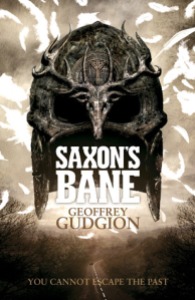“I never knew you were like that…” – Guestpost by Geoffrey Gudgion
People have said some strange things to me since Saxon’s Bane was published.
“I never knew you were like that,” an elderly lady from my local church said to me one Sunday.
“Like what?” I asked. The question made me stop in my tracks, and the departing congregation flowed around us.
She shuffled, making that eyes-lowered squirm with which Christian ladies of a certain age simultaneously mention and avoid mentioning delicate subjects. “Well, you know…”
“No, I don’t know. What’s the matter?” I sensed that the subject causing her such embarrassment was of a reprehensible and possibly sexual nature, and my mind raced in a frantic ‘Oh-God-what-have-I-got-to-be-guilty-about’ way. I drew a blank, but the worry remained.
“I read your book.”
Ah. Huge sigh of relief. Saxon’s Bane includes pagan practices and probably isn’t a book that the vicar would read from the pulpit.
“And?”
“Your character, he, err, notices women.”
Oh, that. Perhaps she had an innocent understanding of the male psyche. I explained that the main character was a single, heterosexual man in his thirties who has been cooped up in hospital for four months, when his only female company had arrived carrying a hypodermic needle. He may suffering from Post-Traumatic Stress, and is certainly a little insecure. He’s courageous but stubborn, emotionally incontinent, and flawed. Yes, he notices women. Is that a problem?
The elderly lady made a slight flutter with her hands, vaguely indicative of an area below the waist, before she repeated herself. “I never knew you were like that.”
It was an early lesson for me in being a published author. The autobiographical element is assumed, but assumed selectively. Female characters may be “well drawn” but the male protagonist can only be me. His strengths are my aspirations, and his weaknesses are mine. I wonder what reaction Sebastian Faulks had after writing his brilliant novel Engleby in the ‘voice’ of a man you’d want to scrape off the bottom of your shoe. Perhaps after you’ve written Birdsong and Charlotte Gray your readers take a more balanced view. For those of us still establishing our literary credibility, it’s worth remembering that although good stories match flawed good against complex evil, the trick is to make the flaws appealing.
The reality, of course, is that there is inevitably some autobiographical content. As I wrote Saxon’s Bane the characters became so well known to me that I was able to become the individual I had created, even the female ones, and as I set them loose they’d tell me how each scene must develop. The boundary between self and artifice became so blurry that I sometimes had to stand back and unpick myself from this world of my own creation.
I’ve found I can also write from a female point of view, with a little help and critiquing from my wife and from women at my writers’ group. Over half of my next book is written in a female ‘voice’, and I’m told it sounds totally authentic. I shall be fascinated to hear readers’ feedback, if and when it is published. Will the few, lyrically-crafted moments of female sexuality be dismissed as ‘pure male fantasy’? Will someone again say “I never knew…”?
It is a strange and delightful thing, this ability and willingness to craft a female persona from within a male brain. I think that by the time I finished Saxon’s Bane I may even have been a little in love with one of the female protagonists.
“Great character, that Eadlin,” a man said about her after Saxon’s Bane was book of the month at his book club. “Wonderfully fleshed out.”
“Excuse me?” I looked in vain for signs that the double-entendre was intentional. Eadlin’s character, I should explain, has an earthy, girl-next-door sexuality. She has curves.
“No, I mean she’s well rounded.”
It’s great to watch someone else dig themselves into a pit of their own making. I wish, eight months after the book was released, that I’d made notes of the best remarks that have come my way. Some have been amusing, like the ones I’ve shared. Some have been gloriously, ego-boostingly flattering, while some have been crushing, like the local independent bookseller who declined to stock because she was “inundated with local authors”.
But the prize for the funniest has to go to my wife’s mother, who held on for some time to the view that her son-in-law should be out earning a salary rather than indulging in all this writing stuff. My wife rang her up when Solaris bought the English language rights to Saxon’s Bane.
“Wonderful news, Mummy! Geoffrey’s got a publishing contract!”
“Oh.” A pause. “But has he got work?”
About the author:
 I was a scholarship kid who was never bright enough to realise I’d have been happier as a writer than a businessman. Until, that is, I had a spectacular row with my boss and stepped off the corporate ladder. Long before that epiphany, I left school at 17 to join the Royal Navy, and was later sponsored by the RN to read Geography at Cambridge University. I made my first attempts at writing fiction during long deployments in warships. In a subsequent, business career, I consistently failed to reconcile writing with being CEO of a technology company.
I was a scholarship kid who was never bright enough to realise I’d have been happier as a writer than a businessman. Until, that is, I had a spectacular row with my boss and stepped off the corporate ladder. Long before that epiphany, I left school at 17 to join the Royal Navy, and was later sponsored by the RN to read Geography at Cambridge University. I made my first attempts at writing fiction during long deployments in warships. In a subsequent, business career, I consistently failed to reconcile writing with being CEO of a technology company.
I live in the Chiltern Hills between London and Oxford. When not writing I am an enthusiastic, amateur equestrian and a very bad pianist. Both passions have been known to creep into my writing.
You can find more about Geoffrey on his website, twitter or Goodreads.
About the book:
 Fergus Sheppard’s world changes forever the day his car crashes near the remote village of Allingley. Traumatised by his near-death experience, he returns to thank the villagers who rescued him, and stays to work at the local stables as he recovers from his injuries. He will discover a gentler pace of life, fall in love ¬ and be targeted for human sacrifice.
Fergus Sheppard’s world changes forever the day his car crashes near the remote village of Allingley. Traumatised by his near-death experience, he returns to thank the villagers who rescued him, and stays to work at the local stables as he recovers from his injuries. He will discover a gentler pace of life, fall in love ¬ and be targeted for human sacrifice.
Clare Harvey’s life will never be the same either. The young archaeologist’s dream find ¬ the peat-preserved body of a Saxon warrior ¬ is giving her nightmares. She can tell that the warrior had been ritually murdered, and that the partial skeleton lying nearby is that of a young woman. And their tragic story is unfolding in her head every time she goes to sleep.
Fergus discovers that his crash is uncannily linked to the excavation, and that the smiling and beautiful countryside harbours some very dark secrets.
As the pagan festival of Beltane approaches, and Clare’s investigation reveals the full horror of a Dark Age war crime, Fergus and Clare seem destined to share the Saxon couple’s bloody fate.
Buy the book on Amazon or The Book Depository.


